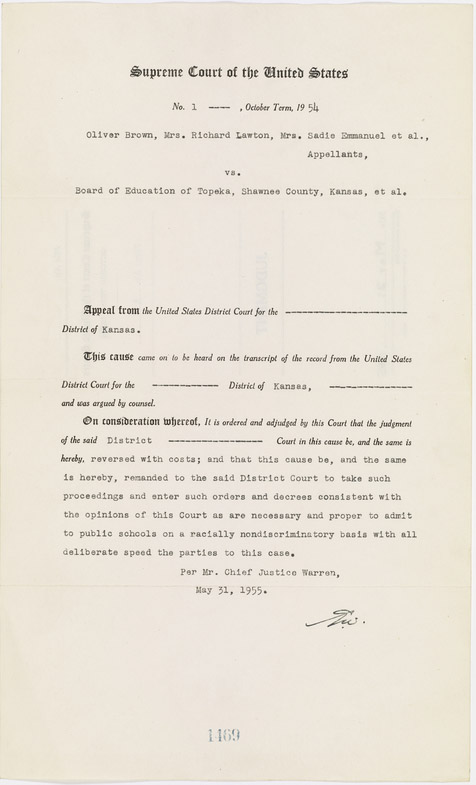70th Anniversary of Brown v. Board of Education of Topeka
Equity in Education: 70 Years Later
On May 17, 1954, the Supreme Court delivered a unanimous ruling in Brown v. Board of Education of Topeka that “separate but equal” was unconstitutional in public schools. Overturning the 1896 decision in Plessy v. Ferguson that allowed for school segregation, this landmark decision made it clear that racial discrimination in public schools was a violation of the 14th Amendment. The Supreme Court opinion written by Chief Justice Earl Warren stated that “separate educational facilities are inherently unequal.” A follow-up judgment delivered in 1955 directed the states to develop desegregation plans “with all deliberate speed.”
President Dwight D. Eisenhower faced a major challenge to school desegregation in 1957. Known as the “Little Rock Crisis,” Eisenhower sent federal troops to Central High School in Little Rock, Arkansas, to uphold school desegregation efforts. Five years later, John F. Kennedy appealed to the public to uphold the law as James Meredith became the first African American to register at the University of Mississippi. Every President since has faced challenges improving equity in education, whether it be Richard Nixon signing the Education Amendments Act of 1972, William J. Clinton’s era of educational reform, George W. Bush’s No Child Left Behind Act of 2001, or Donald J. Trump’s 2020 executive order expanding school choice.
Research by the Government Accountability Office released in 2019 notes that while student populations have become increasingly more diverse, schools themselves continue to be divided along economic and racial lines. Despite expanded efforts in the fight for social justice and equality, racial equity in education continues to be elusive 70 years later.

Related Online Resources:
National Archives Catalog: Brown v. Board of Education of Topeka, Kansas
Milestone Documents: Brown v. Board of Education (1954)
Educator Resources: Brown v. Board of Education
DocsTeach: School Desegregation Court Cases: Mendez v. Westminster and Brown v. Board
Prologue Magazine: Brown v. Board of Education of Topeka, A Landmark Case Unresolved Fifty Years Later
Eisenhower Library: The Eisenhower Administration and Civil Rights: The School Integration Issue
Kennedy Library: 50th Anniversary of Brown v. Board of Education
The Unwritten Record: Restoring Nine from Little Rock
The Featured Document Display is made possible in part by the National Archives Foundation through the generous support of Verizon.
Featured Image: President Barack Obama Commemorates the 60th Anniversary of the Brown v. Board of Education at the White House, May 16, 2014. Barack Obama Presidential Library. View in National Archives Catalog